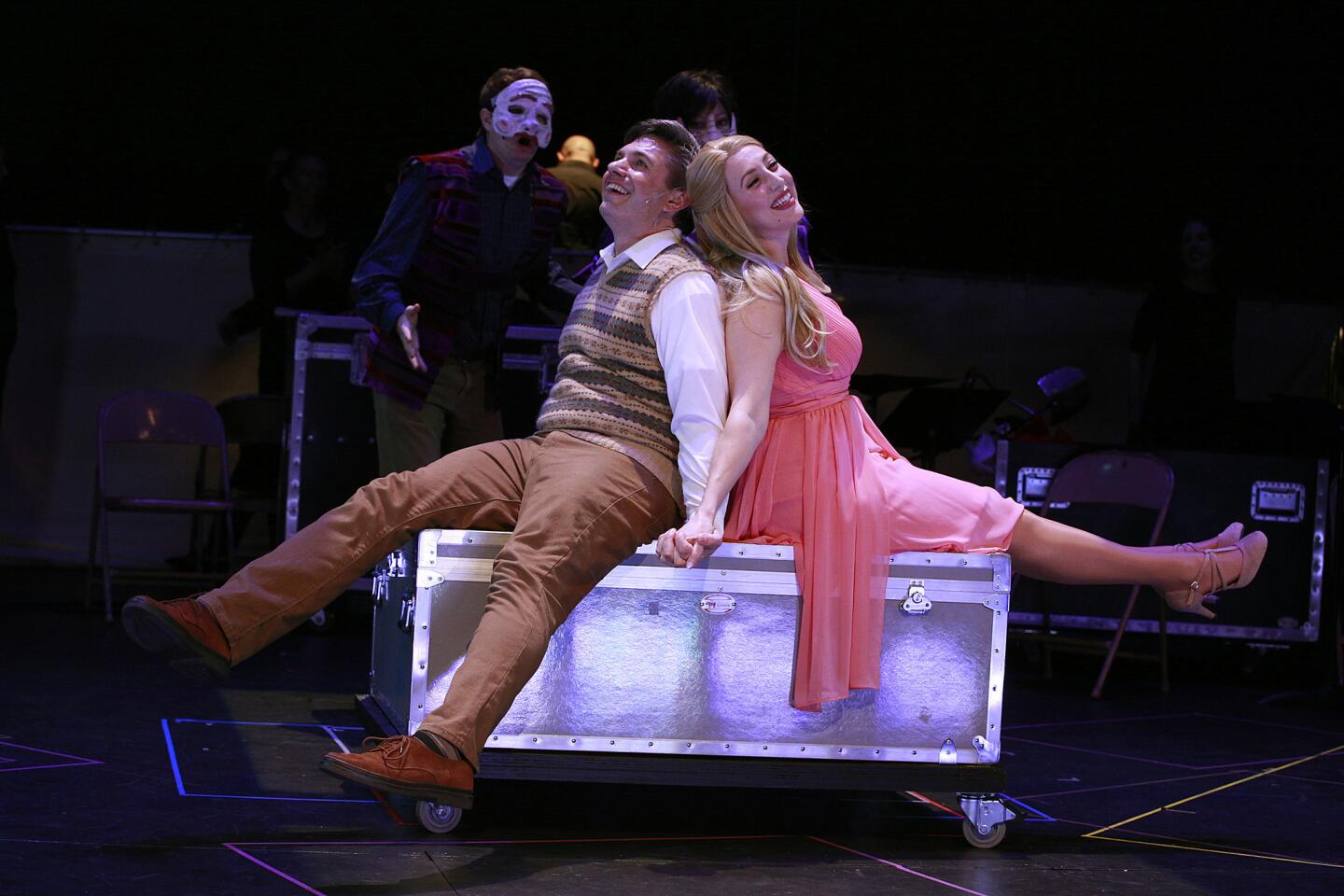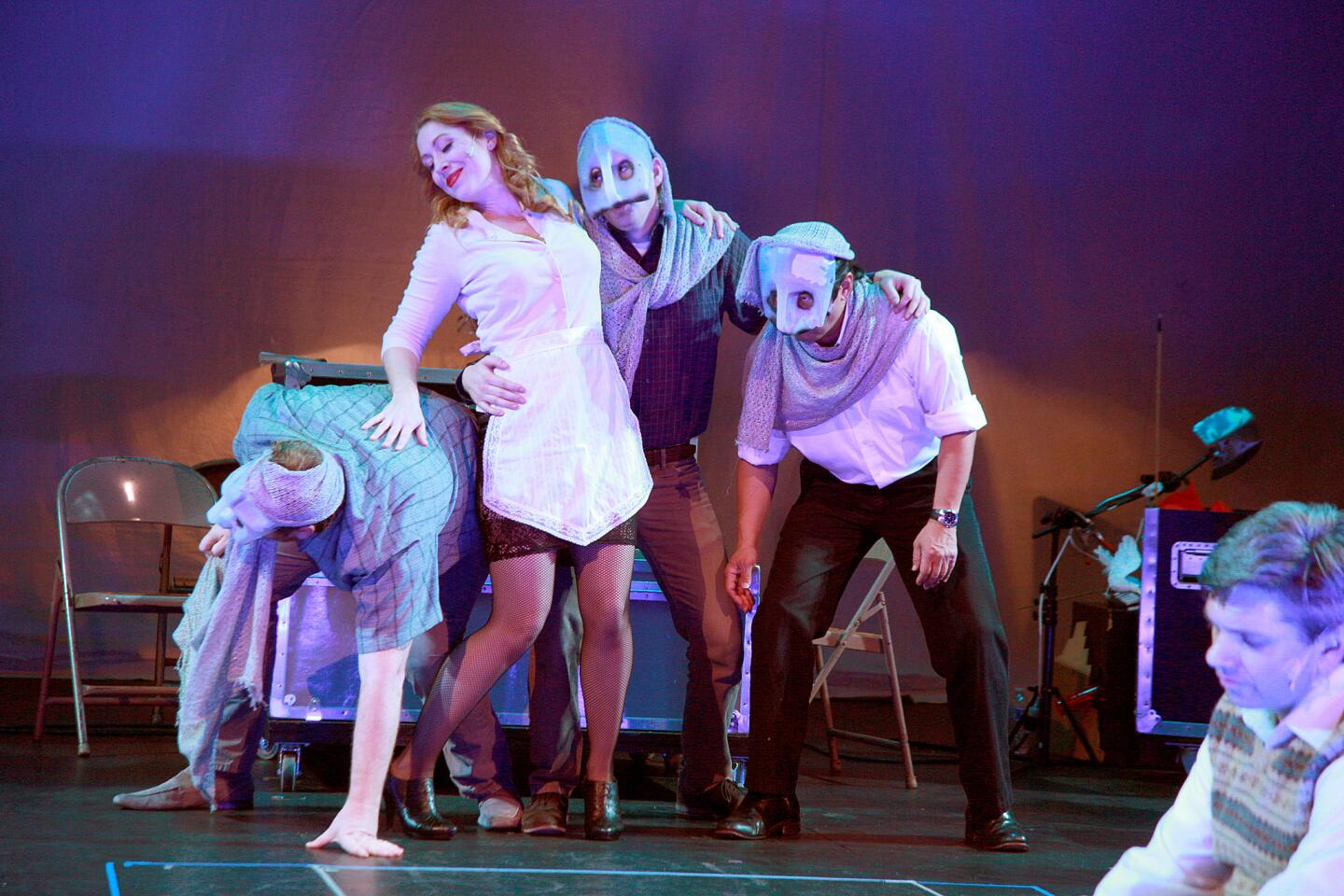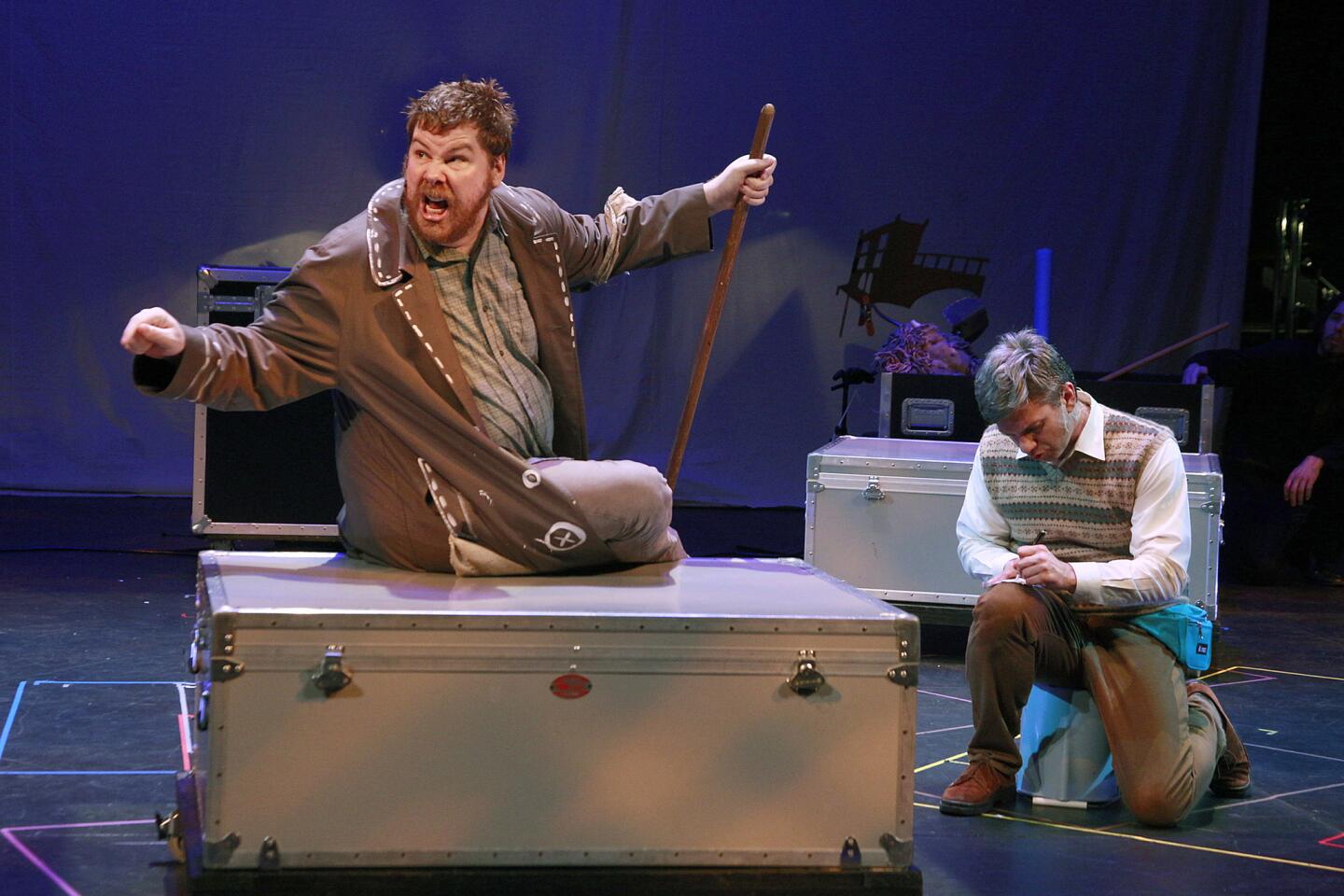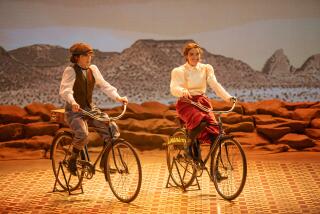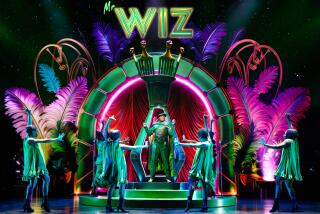Review: ‘Candide’ is revisited in a playfully imaginative staging by Long Beach Opera
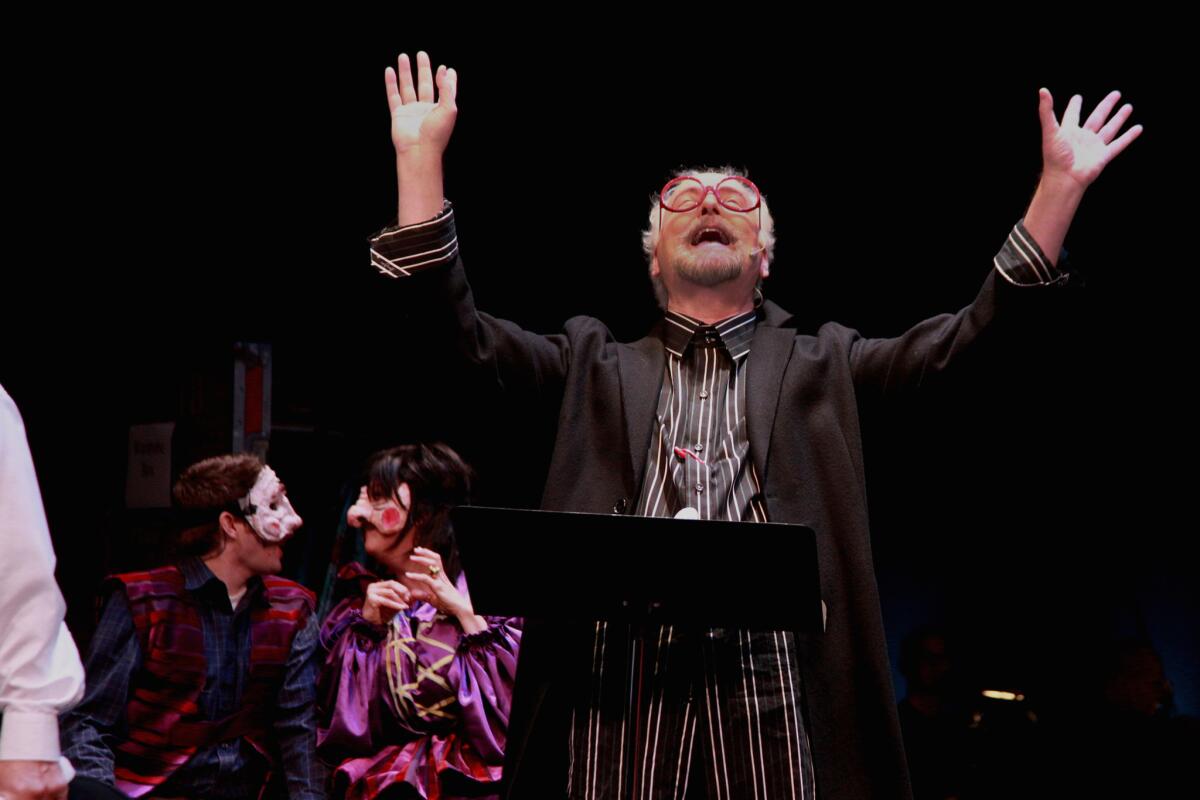
Robin Buck stars as Voltaire and Pangloss in Long Beach Opera’s production of “Candide.”
A flop with a glittering score.
That was the consensus verdict after Leonard Bernstein’s “Candide,” a musical adapted from Voltaire’s slim, satiric 1759 novel, closed on Broadway shortly after it opened in 1956.
Long Beach Opera is revisiting the show, which has had difficulty shaking its reputation for being a prestige failure.
Of course, there have been multiple attempts at redemption, the most notable being Hal Prince’s full-scale reimagining of the musical. His radically overhauled “Candide,” which opened on Broadway in 1974 to much greater success, replaced Lillian Hellman’s book with one by Hugh Wheeler and dispersed the audience so the action was happening all round them.
Some felt Prince’s staging, while working out ingenious solutions to the theatrical challenges posed by the musical, gave short shrift to the score. “Candide” is one of Bernstein’s works that, while written for the theater, can also be savored in a concert hall.
The same might be said for “West Side Story,” but Bernstein’s pinnacle achievement as a musical theater composer cries out to be seen as well as heard. “Candide,” not so much.
Is the work a musical comedy, an operetta or an opera? Bernstein left it to others to decide, yet a recording of the 1989 concert version he conducted (posthumously released) ensured that the debate would continue after his death.
Long obsessed with this theatrical Rubik’s Cube, director David Schweizer rejiggers the balance between the music and the comedy in a staging that is light on its feet, winkingly meta-theatrical and frequently carnivalesque. His Long Beach Opera production, which opened last weekend and has two additional performances this Saturday, treats the score with affection, yet never allows it to eclipse the other elements of the storytelling.
The laborious collaborative history of “Candide” is evident in the list of credits. This production opts for the Royal National Theatre version of the show, featuring John Caird’s revamping of Wheeler’s book. Richard Wilbur’s original lyrics still have pride of place in the program, but the illustrious names supplying additional lyrics (Stephen Sondheim, John Latouche, Hellman, Dorothy Parker and Bernstein) attest to the many chefs who have had a hand at one time in preparing this tricky recipe.
The stage is suspiciously deprived of scenery at the start of this new production. The LBO Orchestra, conducted by Kristof Van Grysperre, is seated in the background. Front and center are merely a few chairs and music stands and some trunks.
The initial conceit is that we’re watching an open rehearsal. There is some jockeying at the start for parts as Voltaire (played by Robin Buck) oversees his handiwork coming to life onstage. He is both narrator and director, but once Buck dons a pair of red eyeglasses, Voltaire is transformed into Doctor Pangloss, the relentless optimist who keeps preaching the philosophy that this is the best of all possible worlds even as disasters, natural and man-made, rain down on him and his company.
The story has been condensed here so the dialogue doesn’t swamp the score. But the basic dramatic outline remains intact: Candide (Todd Strange), thrust out into the world for loving the higher-born Cunegonde (Jamie Chamberlin), is put through a series of often brutal and humiliating adventures as he attempts to reunite with his beloved.
Braving one hideous setback after the next, Candide comes to see the falsehood of Pangloss’ doctrine, the way such moralizing prattle callously ignores tremendous human suffering. In the end, our disillusioned but not defeated hero recognizes that the best we can do, in the famous last line of the novel, is to cultivate our garden.
Voltaire, whose stylish wit gave voice to Enlightenment principles, couldn’t resist caricaturing this “all is for the best” attitude in a philosophical tale that incorporates real-world horror (a deadly earthquake, the Inquisition, rape and plunder) while treating the characters like marionettes.
This Punch-and-Judy-for-rationalists quality of the novel is taken literally by Schweizer. Masks, puppets and even rainbow-colored phalluses (by scenic designer Sean T. Cawelti of Rogue Artists Ensemble) are frolicsomely deployed in a staging that is always playfully imaginative if occasionally dramatically smudgy. Stagehands magically become puppeteers, enlivening the bounce of a musical in which all manner of bodily harm is inflicted, yet without the fear of blood being spilled.
The characters, portrayed by a small and antic ensemble, rise up with the cartoon resiliency of Porky Pig and Bugs Bunny. Costume designer Lori Meeker differentiates among the various roles assumed by the performers with a sometimes wacky, sometimes ribald insouciance.
The larky spirit of the staging infects that handling of the songs — utterly appropriate for a show that sends up music forms with the same zing that it satirizes ideas.
Chamberlin has a field day with the coloratura lampooning of “Glitter and Be Gay,” the song that allowed a still-young Barbara Cook to show off her agile soprano in the original Broadway production. The number continues to steal the show.
Strange’s Candide, dressed like an overgrown schoolboy in a vest and khakis, delivers his solos with the proper earnestness of a protagonist who needs the ceiling to fall on his head before awakening to the patented ludicrousness of Pangloss’ creed.
Suzan Hanson, who plays the weight-challenged Baroness among other outlandish figures, is the standout in the supporting cast. Roberto Perlas Gomez and Arnold Livingston Geis gambol gamely through their battery of male roles.
The circus atmosphere of this “Candide” tries to draw out all the color of Bernstein’s spoofing of European theatrical music (from the comic grotesquerie of “Auto-Da-Fé” to the teasing giddiness of “The Venice Gavotte”). The result is unfailingly lively, though it doesn’t have me hankering for another Broadway revival.
The musical’s narrative doesn’t come off so much as incoherent (a long-standing complaint) as exhaustingly herky-jerky. But if I may conclude with a Panglossian spin, each production brings us closer to a deeper understanding of what Bernstein, in his magnificent if not readily reconcilable genius, was striving to accomplish in ushering Voltaire’s classic to the musical stage.
More to Read
The biggest entertainment stories
Get our big stories about Hollywood, film, television, music, arts, culture and more right in your inbox as soon as they publish.
You may occasionally receive promotional content from the Los Angeles Times.


